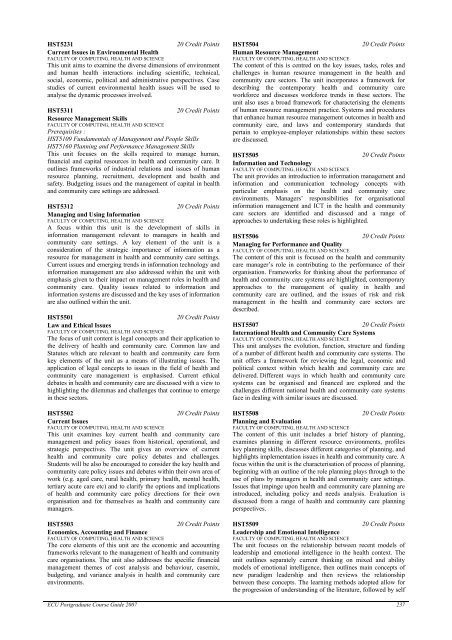Course Guide - Edith Cowan University
Course Guide - Edith Cowan University
Course Guide - Edith Cowan University
You also want an ePaper? Increase the reach of your titles
YUMPU automatically turns print PDFs into web optimized ePapers that Google loves.
HST5231<br />
20 Credit Points<br />
Current Issues in Environmental Health<br />
FACULTY OF COMPUTING, HEALTH AND SCIENCE<br />
This unit aims to examine the diverse dimensions of environment<br />
and human health interactions including scientific, technical,<br />
social, economic, political and administrative perspectives. Case<br />
studies of current environmental health issues will be used to<br />
analyse the dynamic processes involved.<br />
HST5311<br />
20 Credit Points<br />
Resource Management Skills<br />
FACULTY OF COMPUTING, HEALTH AND SCIENCE<br />
Prerequisites :<br />
HST5109 Fundamentals of Management and People Skills<br />
HST5160 Planning and Performance Management Skills<br />
This unit focuses on the skills required to manage human,<br />
financial and capital resources in health and community care. It<br />
outlines frameworks of industrial relations and issues of human<br />
resource planning, recruitment, development and health and<br />
safety. Budgeting issues and the management of capital in health<br />
and community care settings are addressed.<br />
HST5312<br />
20 Credit Points<br />
Managing and Using Information<br />
FACULTY OF COMPUTING, HEALTH AND SCIENCE<br />
A focus within this unit is the development of skills in<br />
information management relevant to managers in health and<br />
community care settings. A key element of the unit is a<br />
consideration of the strategic importance of information as a<br />
resource for management in health and community care settings.<br />
Current issues and emerging trends in information technology and<br />
information management are also addressed within the unit with<br />
emphasis given to their impact on management roles in health and<br />
community care. Quality issues related to information and<br />
information systems are discussed and the key uses of information<br />
are also outlined within the unit.<br />
HST5501<br />
20 Credit Points<br />
Law and Ethical Issues<br />
FACULTY OF COMPUTING, HEALTH AND SCIENCE<br />
The focus of unit content is legal concepts and their application to<br />
the delivery of health and community care. Common law and<br />
Statutes which are relevant to health and community care form<br />
key elements of the unit as a means of illustrating issues. The<br />
application of legal concepts to issues in the field of health and<br />
community care management is emphasised. Current ethical<br />
debates in health and community care are discussed with a view to<br />
highlighting the dilemmas and challenges that continue to emerge<br />
in these sectors.<br />
HST5502<br />
20 Credit Points<br />
Current Issues<br />
FACULTY OF COMPUTING, HEALTH AND SCIENCE<br />
This unit examines key current health and community care<br />
management and policy issues from historical, operational, and<br />
strategic perspectives. The unit gives an overview of current<br />
health and community care policy debates and challenges.<br />
Students will be also be encouraged to consider the key health and<br />
community care policy issues and debates within their own area of<br />
work (e.g. aged care, rural health, primary health, mental health,<br />
tertiary acute care etc) and to clarify the options and implications<br />
of health and community care policy directions for their own<br />
organisation and for themselves as health and community care<br />
managers.<br />
HST5503<br />
20 Credit Points<br />
Economics, Accounting and Finance<br />
FACULTY OF COMPUTING, HEALTH AND SCIENCE<br />
The core elements of this unit are the economic and accounting<br />
frameworks relevant to the management of health and community<br />
care organisations. The unit also addresses the specific financial<br />
management themes of cost analysis and behaviour, casemix,<br />
budgeting, and variance analysis in health and community care<br />
environments.<br />
HST5504<br />
20 Credit Points<br />
Human Resource Management<br />
FACULTY OF COMPUTING, HEALTH AND SCIENCE<br />
The content of this is centred on the key issues, tasks, roles and<br />
challenges in human resource management in the health and<br />
community care sectors. The unit incorporates a framework for<br />
describing the contemporary health and community care<br />
workforce and discusses workforce trends in these sectors. The<br />
unit also uses a broad framework for characterising the elements<br />
of human resource management practice. Systems and procedures<br />
that enhance human resource management outcomes in health and<br />
community care, and laws and contemporary standards that<br />
pertain to employee-employer relationships within these sectors<br />
are discussed.<br />
HST5505<br />
20 Credit Points<br />
Information and Technology<br />
FACULTY OF COMPUTING, HEALTH AND SCIENCE<br />
The unit provides an introduction to information management and<br />
information and communication technology concepts with<br />
particular emphasis on the health and community care<br />
environments. Managers’ responsibilities for organisational<br />
information management and ICT in the health and community<br />
care sectors are identified and discussed and a range of<br />
approaches to undertaking these roles is highlighted.<br />
HST5506<br />
20 Credit Points<br />
Managing for Performance and Quality<br />
FACULTY OF COMPUTING, HEALTH AND SCIENCE<br />
The content of this unit is focused on the health and community<br />
care manager’s role in contributing to the performance of their<br />
organisation. Frameworks for thinking about the performance of<br />
health and community care systems are highlighted, contemporary<br />
approaches to the management of quality in health and<br />
community care are outlined, and the issues of risk and risk<br />
management in the health and community care sectors are<br />
described.<br />
HST5507<br />
20 Credit Points<br />
International Health and Community Care Systems<br />
FACULTY OF COMPUTING, HEALTH AND SCIENCE<br />
This unit analyses the evolution, function, structure and funding<br />
of a number of different health and community care systems. The<br />
unit offers a framework for reviewing the legal, economic and<br />
political context within which health and community care are<br />
delivered. Different ways in which health and community care<br />
systems can be organised and financed are explored and the<br />
challenges different national health and community care systems<br />
face in dealing with similar issues are discussed.<br />
HST5508<br />
20 Credit Points<br />
Planning and Evaluation<br />
FACULTY OF COMPUTING, HEALTH AND SCIENCE<br />
The content of this unit includes a brief history of planning,<br />
examines planning in different resource environments, profiles<br />
key planning skills, discusses different categories of planning, and<br />
highlights implementation issues in health and community care. A<br />
focus within the unit is the characterisation of process of planning,<br />
beginning with an outline of the role planning plays through to the<br />
use of plans by managers in health and community care settings.<br />
Issues that impinge upon health and community care planning are<br />
introduced, including policy and needs analysis. Evaluation is<br />
discussed from a range of health and community care planning<br />
perspectives.<br />
HST5509<br />
20 Credit Points<br />
Leadership and Emotional Intelligence<br />
FACULTY OF COMPUTING, HEALTH AND SCIENCE<br />
The unit focuses on the relationship between recent models of<br />
leadership and emotional intelligence in the health context. The<br />
unit outlines separately current thinking on mixed and ability<br />
models of emotional intelligence, then outlines main concepts of<br />
new paradigm leadership and then reviews the relationship<br />
between these concepts. The learning methods adopted allow for<br />
the progression of understanding of the literature, followed by self<br />
ECU Postgraduate <strong>Course</strong> <strong>Guide</strong> 2007 237



